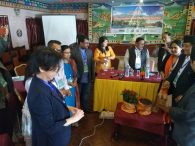The MTCP2 South Asia + China Sub-Regional Steering Committee Meeting was conducted on 3-5 April 2019 at Hotel Marsyangdi in Kathmandu, Nepal.

MTCP2 South Asia National Implementing Agency and farmers’ representatives gather for the opening ceremony of the meeting.
Bharati Pathak, Chairperson of FECOFUN, addressed the delegates. She wished the meeting a success and all farmers’ organizations moving forward and transcending challenges.

In his opening message, Zainal Arifin Fuad of La Via Campesina shared the journey of farmers’ organizations (FOs) with IFAD and the rightful partners for rural development. He emphasized the role of FOs in pushing for the implementation of farmers and rural development programmes.

Binod Saha, country director of FAO Nepal, acknowledged the importance of supporting family farming. He said that most small farmers in Nepal are family farmers. He also expressed his excitement to know the results of MTCP2 Program from the different countries in South Asia and China. He said that the MTCP2 platform is a great venue to discuss and promote and identify interventions for small holder farmers.

In his message, Keshav Lal Shrestha, Chairperson of ANPFa, said that private ownership of land is a big challenge towards agricultural development involving small holder farmers.
Hari Prasad Parajuli, Agriculture Minister and Vice Chairperson of ANPFa, and Lany Rebagay, program manager of MTCP2, also addressed the delegates.

Dr. Keshab Raj Khadka, Senior Technical Advisor for MTCP2 South Asia, facilitated the opening day of the meeting along with Lany Rebagay.

Maruja Ventura, Asian Farmers’ Association Finance Manager, shared the updated financial status of MTCP2 South Asia + China.

On the second day of the SRSC South Asia + China, Smita Bathnagar of MTCP2 India lead the energizer.

Maureen Wang from the Agricultural Management Institute of China shared the updated of MTCP2 implementation in the country. AMI conducted seminars, field visits and symposium among Agricultural cooperative leaders and managers. The Chinese government is encouraging young people to be involved in agriculture. Some educated young people go back to their hometown to share what they learned from the university, learn from farmers and share innovative ideas in agriculture.

Mujibul Munir of Coast Trust Bangladesh shared the progress of MTCP2 implementation in Bangladesh. The NIA in Bangladesh conducted training including financial management and other capacity building to empower the farmers’ organizations to manage their own cooperatives.
Smita Bathnagar, SEWA India, shared the implementation updates of MTCP2 in the country. Farmers should have minimum support income. How do we do this? We partner with government, academe, IFAD, FAO and other organizations to get knowledge, inputs and funds are welcome of course.

Zainal Arifin Fuad hosted the country reporting at the SRSC SA + China. The day before, he said: “The slogan NO FARMER, NO FOOD is no longer true. Farmers are now being replaced with robots.”

Dr. Keshab Raj Khadka, All Nepal Peasants’ Federation (ANPFa), shared the progress of MTCP2 implementation in Nepal. He also shared the vision of a vegetarian food system which is healthy and environment friendly.
Saima Zia shared the MTCP2 country implementation updates in Pakistan. To encourage youth participation, CF partnered with the academe, specifically University of the Punjab’s Department of Agriculture.
Shamila Rhatnasooriya shared the MTCP2 implementation updates in Sri Lanka: Micro-financing is becoming a dangerous business now, with reported 170 suicide cases, especially among women. LFF campaigned for the review of MFIs and their operations.

Lany Rebagay discussed the South Asia sub-regional engagements: MTCP2 partnered with SAARC Agriculture Center (SAC) in convening government and Farmers’ Organizations in a learning exchange on seeds and agriculture cooperatives. There is also partnership with FAO on women and youth. A forum will be organised sometime in June 2019.
Hubert Boirard, MTCP Task Manager shared five criteria that IFAD looks into when designing and assessing/evaluating a programme:
- relevance
- effectiveness
- efficiency
- targeting
- sustainability
Zhou Zhongli of Agricultural Management Institute (AMI) of China, taught the SRSC South Asia and China participants the rabbit dance to start the 3rd day SRSC South Asia + China hopping and kicking.
Lany Rebagay shared the components of the upcoming project, Asia Pacific Farmers Programme.
Mujibul Munir shared plans for Asia Pacific Farmers Program. He expressed appreciation of the programme design as it comprehensively covers important capacity building aspects of farmers organizations.
Smita Bathnagar, SEWA, shared India’s initial APFP plans. She said SEWA appreciates the focus of APFP: policies that will help farmers do business and better economic services to farmers.
Dr. Khadka shared the initial APFP plans involving 14 national farmers organizations in the country. Diversify. If small farmers concentrate only on one commodity, they will not get much money.
Shamila Rhatnasooriya, representing Lankan Farmers Forum shared thoughts on APFP: The design is very focused, yet highly technical and business oriented. They need good experts to be able to implement the programme.
Saima Zia, MTCP2 Pakistan, shared thoughts on APFP. She said that Pakistani farmers organizations need to discuss about agri-business and cooperatives first.
Maureen Wang, AMI, shared thoughts on APFP. She said that her team sees their future role in assisting farmers cooperatives in formulating business plans, especially if they are to focus on commodities.
Hubert Boirard also shared his thoughts about professionalising farmers organizations: It is not asking farmers to do everything–produce, negotiate for marketing, manage business–it is providing a team to assist them do marketing, managing, and other things that will help them do business. That is building their capacity.








































Comments are closed